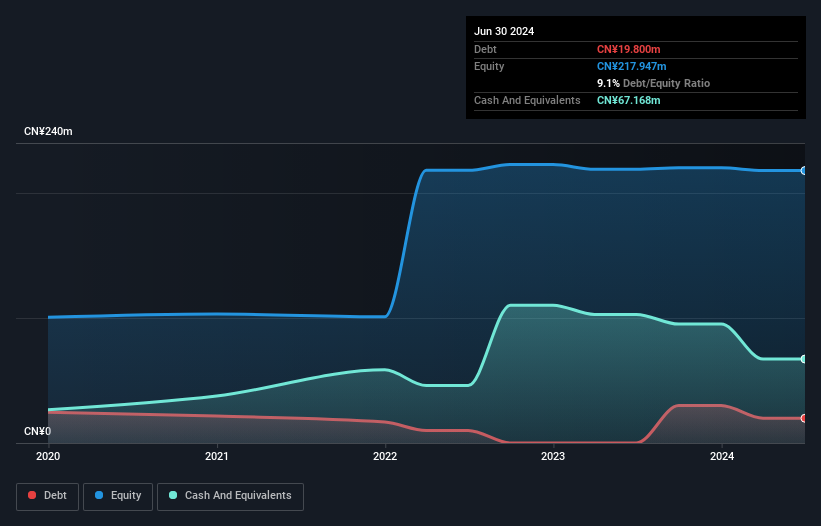Warren Buffett famously said, 'Volatility is far from synonymous with risk.' So it seems the smart money knows that debt - which is usually involved in bankruptcies - is a very important factor, when you assess how risky a company is. As with many other companies WEIli Holdings Limited (HKG:2372) makes use of debt. But the more important question is: how much risk is that debt creating?
Why Does Debt Bring Risk?
Debt and other liabilities become risky for a business when it cannot easily fulfill those obligations, either with free cash flow or by raising capital at an attractive price. Ultimately, if the company can't fulfill its legal obligations to repay debt, shareholders could walk away with nothing. However, a more usual (but still expensive) situation is where a company must dilute shareholders at a cheap share price simply to get debt under control. By replacing dilution, though, debt can be an extremely good tool for businesses that need capital to invest in growth at high rates of return. The first step when considering a company's debt levels is to consider its cash and debt together.
Check out our latest analysis for WEIli Holdings
What Is WEIli Holdings's Net Debt?
You can click the graphic below for the historical numbers, but it shows that as of June 2024 WEIli Holdings had CN¥19.8m of debt, an increase on none, over one year. But it also has CN¥67.2m in cash to offset that, meaning it has CN¥47.4m net cash.

A Look At WEIli Holdings' Liabilities
Zooming in on the latest balance sheet data, we can see that WEIli Holdings had liabilities of CN¥90.1m due within 12 months and liabilities of CN¥1.56m due beyond that. Offsetting these obligations, it had cash of CN¥67.2m as well as receivables valued at CN¥135.3m due within 12 months. So it actually has CN¥110.8m more liquid assets than total liabilities.
This excess liquidity is a great indication that WEIli Holdings' balance sheet is almost as strong as Fort Knox. On this view, lenders should feel as safe as the beloved of a black-belt karate master. Simply put, the fact that WEIli Holdings has more cash than debt is arguably a good indication that it can manage its debt safely. The balance sheet is clearly the area to focus on when you are analysing debt. But you can't view debt in total isolation; since WEIli Holdings will need earnings to service that debt. So when considering debt, it's definitely worth looking at the earnings trend. Click here for an interactive snapshot.
Over 12 months, WEIli Holdings reported revenue of CN¥184m, which is a gain of 17%, although it did not report any earnings before interest and tax. We usually like to see faster growth from unprofitable companies, but each to their own.
So How Risky Is WEIli Holdings?
Statistically speaking companies that lose money are riskier than those that make money. And in the last year WEIli Holdings had an earnings before interest and tax (EBIT) loss, truth be told. And over the same period it saw negative free cash outflow of CN¥45m and booked a CN¥959k accounting loss. With only CN¥47.4m on the balance sheet, it would appear that its going to need to raise capital again soon. Overall, its balance sheet doesn't seem overly risky, at the moment, but we're always cautious until we see the positive free cash flow. There's no doubt that we learn most about debt from the balance sheet. But ultimately, every company can contain risks that exist outside of the balance sheet. We've identified 3 warning signs with WEIli Holdings (at least 1 which is a bit unpleasant) , and understanding them should be part of your investment process.
If you're interested in investing in businesses that can grow profits without the burden of debt, then check out this free list of growing businesses that have net cash on the balance sheet.
Valuation is complex, but we're here to simplify it.
Discover if WEIli Holdings might be undervalued or overvalued with our detailed analysis, featuring fair value estimates, potential risks, dividends, insider trades, and its financial condition.
Access Free AnalysisHave feedback on this article? Concerned about the content? Get in touch with us directly. Alternatively, email editorial-team (at) simplywallst.com.
This article by Simply Wall St is general in nature. We provide commentary based on historical data and analyst forecasts only using an unbiased methodology and our articles are not intended to be financial advice. It does not constitute a recommendation to buy or sell any stock, and does not take account of your objectives, or your financial situation. We aim to bring you long-term focused analysis driven by fundamental data. Note that our analysis may not factor in the latest price-sensitive company announcements or qualitative material. Simply Wall St has no position in any stocks mentioned.
About SEHK:2372
WEIli Holdings
An investment holding company, engages in the manufacture and sale of cigarette packaging paper in the People’s Republic of China.
Excellent balance sheet and slightly overvalued.
Market Insights
Community Narratives



